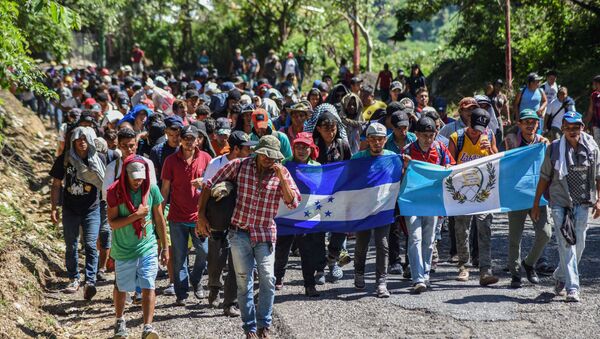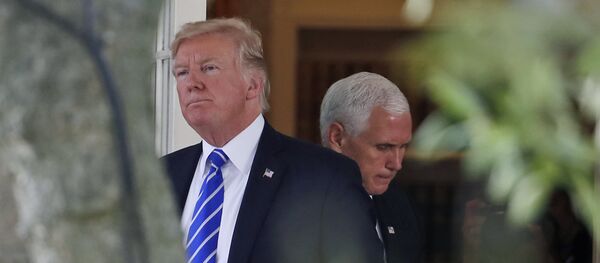The migrant caravan quickly heading towards US borders is both the result of Donald Trump's neo-Monroe Doctrine and George Soros-like liberal donors' effort to tip the balance in favor of Democrats in the upcoming November midterms, Adam Garrie, a geopolitical analyst and director at Eurasia Future, told Sputnik.
"The US destabilization of Honduras during Obama's presidency has certainly led to genuine forced migration from Central America into North America," the analyst said. "At the same time, the high level of organization implicit in the caravan as well as the timing of the caravan just prior to US midterm elections does indicate that Soros style forces are almost certainly at play."
He suggested that "genuine factors inspiring mass migration have been co-opted by Trump's domestic opposition although Trump's stance will likely prove popular with a US public who are turning against mass migration just as many European citizens are doing the same."
To those in the Caravan, turnaround, we are not letting people into the United States illegally. Go back to your Country and if you want, apply for citizenship like millions of others are doing!
— Donald J. Trump (@realDonaldTrump) 25 октября 2018 г.
Washington Takes Three Steps to Take Over South America
The US-backed Operation Condor was kicked off in 1975 and envisaged eradicating Soviet influence in Latin America through political repressions and assassination of opponents.
In August 2018 former Vice President of Uruguay Raul Sendic told Sputnik that the so-called "Atlanta plan" described by Manolo Pichardo, Dominican politician and president of the Permanent Conference of Political Parties of Latin America and the Caribbean (COPPAL), in his article for Listín Diario in 2016, was seemingly taking shape in South America.
According to Pichardo, the grand design, allegedly outlined in 2012 by right-wing Latin American politicians and supported by Washington, envisioned initiating defamation campaigns and trials against left-wing leaders in the continent.
However, there was more to the campaign than meets the eye, Garrie says: "Realizing that in the 21st century a more outward looking Latin America that was skeptical of US power would naturally be drawn to China's Belt and Road initiative, the US devised a three pronged strategy to reserve the Pink Tide."
"Mercosur has been successfully turned into body that does little more than rubber stamp US neo-liberal trading policies in the region," the analyst opined. "The hostility between Mercosur and suspended member Venezuela is one notable example of how Mercosur has become a major tool used to implement American policy in the region."
Step two involved putting direct economic pressure on nations "whose foreign and economic policies run contrary to the wishes of Washington," the geopolitical analyst continued, adding that "by making an example of Venezuela, many other nations took note."
"Furthermore, in countries where Pink Tide leaders remained popular, the US covertly aided opposition forces and domestic intelligence services in accusing Pink Tide leaders of largely trumped up corruption charges that rapidly took on a life of their own," Garrie pointed out, citing the impeachment of former Brazilian President Dilma Rousseff and the subsequent jailing of former President Luiz Inácio Lula da Silva.
"In reality, the removal of Rousseff was little more than a constitutional coup while the jailing of the popular Lula was a clear judicial coup that would have almost certainly been condemned by American liberal media had Lula been a pro-US official," he presumed.
As for other leftist Latin American leaders, they "have either been co-opted or de-fanged as is the case with Ecuador's recently elected President Lenin Moreno or Nicaragua's long serving leader Daniel Ortega, who allowed American troops to remain stationed in the country," the analyst elaborated.
Step three is "the use of soft power," Garrie said: While leftist governments are depicted as unilaterally corrupt by Western and pro-Western media sources, pro-American right wing governments are presented as "a force for salvation."
China and Trump's Neo-Monroe Doctrine
Sharing his vision on the future of the Latin American continent, the analyst noted that while "Bolivia, Cuba and Venezuela's left wing governments remain generally stable, the rest of Latin America finds itself in a precarious position."
Thus, Jair Bolsonaro's win in Brazil has indicated that the US continues to gain ground in the region, according to Garrie.
"Brazil was always the 'big prize' for the US and now that the US has effectively achieved what they wanted, other dominoes may likely fall into place more rapidly," he explained, suggesting that Brazil's BRICS membership may lose importance in the eyes of the Bolsonaro government.
Had a very good conversation with the newly elected President of Brazil, Jair Bolsonaro, who won his race by a substantial margin. We agreed that Brazil and the United States will work closely together on Trade, Military and everything else! Excellent call, wished him congrats!
— Donald J. Trump (@realDonaldTrump) 29 октября 2018 г.
However, the key to the Trump administration's neo-Monroe Doctrine "is that it is little more than an anti-China doctrine," the analyst highlighted.
He has drawn attention to the fact that the newly-ratified US-Mexico-Canada free trading agreement which replaced the 1994 NAFTA agreement "contains a clause in which Mexico and Canada are forced to effectively get US approval before making trade deals with nations outside of North America." This means Washington could bring an end to their aspirations to jump on the New Silk Road bandwagon, he added.
"While China's markets are more open than ever to Latin American goods and while China is ready, willing and able to invest in Latin America, Washington will do everything in its power to prevent Latin America from spreading its geo-economic wings and looking to Asia," Garrie concluded.
The views and opinions expressed by the contributors do not necessarily reflect those of Sputnik.





